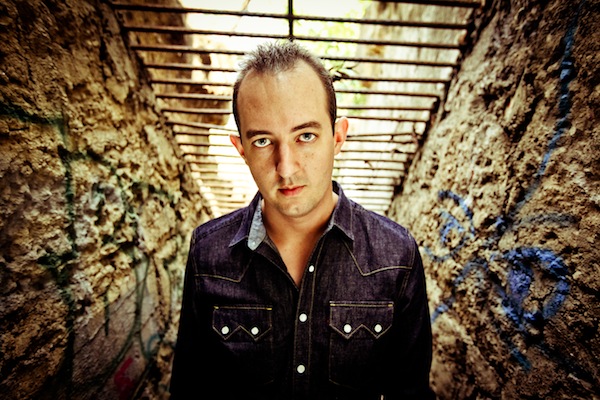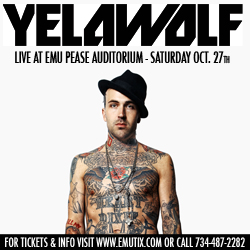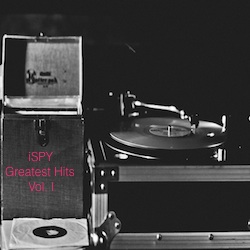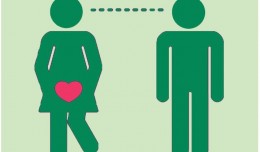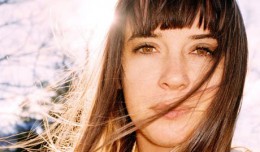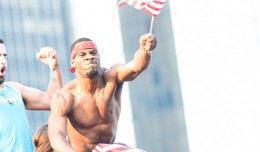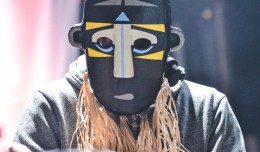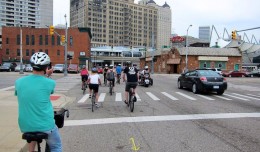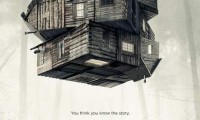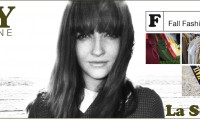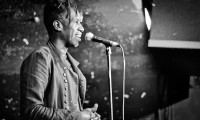Meet the quiet busy-body behind some of the world’s biggest dance parties
Joey Youngman probably never seemed like the DJ type. A born introvert growing up in a small town in California, he spent his time practicing piano and hiding out in record stores until he was exposed to the dance bug. Now he’s one of the hardest-working and most highly-demanded DJs in the world. He’s had a pivotal role in the evolution of electro-house over the past few years, spreading hysteria on Beatport with eight no. one tracks and making Wolfgang Gartner a name to remember at Coachella and Electric Daisy Carnival.
He’s been on the radar for about four years, with only one studio album under his name (along with a recently-released collection of earlier songs). That makes it all the more stunning that a Grammy nomination, four Dance Music Award nominations, and a no. seven ranking in the America’s Best DJ poll are among his achievements. He’s constantly on the move – the dude is known for rarely taking a day off – but he took time for a phone interview a month in advance of his October 9 return to Necto.
Have you performed at Necto before?
I played Necto one time before on the tour I did last year. The weird thing was, it was a bus tour with a lot of production, like the lighting and equipment all in a trailer behind the bus and the size and layout of the club was too small to fit the production. So it was one of the only shows on the tour where I didn’t get to use my production, but it was also one of the best shows on the entire tour. And I really wasn’t expecting that. Especially with it being a little out of the way in a place I don’t consider a major city. It was amazing. The crowd was nuts.
How do you feel about playing in smaller club venues as opposed to some of the larger festival stages?
It’s a completely different experience, and I like them mutually. I can’t say I like one more than the other. With the festival experience you get the rush of looking out and seeing ten or fifteen thousand people, and it’s this incredible feeling. But to play an event of that size, it’s a massive stage and you’re at least 50 feet from the crowd and you don’t really get to vibe off them. You can’t get the visuals, it’s just a mass of people. In a smaller club, it’s a completely different environment. You’re with the crowd and interacting with them, and it’s easier to read them and adjust the set accordingly. They’re totally different, but I like each one the same.”.
What was it like growing up in San Luis Obispo, and when did you get into music?
I lived there until I was about nineteen. San Luis Obispo was and still is a pretty small city. The population is 45,000 I think, and it’s halfway between Los Angeles and San Francisco. When I was just starting to get into music it was like 1993. I think I was thirteen years old, and, at that time, dance music was just starting to explode in the United States – the music and the culture. I started getting into the music by going to the record store every day, just listening to and collecting dance music and within a year or so I started going to warehouse raves. I was fourteen, so my mom would drive me there then pick me up like around 11p.m. or something. Even though it was such a small city, there was so much going on. With the record store and dance style clothing and gear and records and everything, basically the mid and late 90s was like a boom – sort of like what we’re having now, but on a different scale – and it was great. It would have been a lot more exciting living in a bigger city like Los Angeles, but I still had plenty of stuff to do.
How big were the raves?
They weren’t massive, some were one or two thousand person venues, some two or three hundred people, some were out in the mountains and some were hidden – like, you had to go to 7/11 and get directions from this guy, and he would give you directions to another guy who would give you directions to this venue somewhere out in the woods, you know …that type of stuff. Around 1997 or 1998 I started driving out to LA where there were forty to fifty thousand people. Massive. It was a pretty incredible experience.
How did you become involved in producing dance music?
I was always into writing music. I played classical piano for a long time, and that kind of turned into electronic production because my uncle had a little home studio and a lot of gear and stuff. I started making whatever, like pop stuff, and I would sing and make experimental electronic stuff, just messing around, and when I discovered dance music I started just making that stuff for the most part.
Do you remember your first gig?
I used to play at friends’ parties in junior high and high school with these tape decks that had controls on them, and I would use those to DJ parties. But my first real gig was at a club in San Luis Obispo. I think I was sixteen, and my mom drove me there, and I opened and was playing just whatever I knew back then and I was absolutely horrible …I was destroying every mix, but the club was pretty much empty, so luckily no one heard it. But I remember that I was absolutely horrendous. Not ready for primetime at all.
I guess an empty club is a good place to get the nerves out or troubleshoot.
Exactly.
How do you go about constructing your original songs? Does it start with a melody or a particular sound or mood you want explore?
It’s different every time. It depends a lot on what types of shows I’ve been playing. So if I just played a festival tour or a bunch of big, ten thousand person shows, then I’ll have a sound in my head – something that would have gone over well at that type of show, and I’ll go in thinking I want to make something that sounds like that. Sometimes I’ll be listening back to my older stuff and I’ll think, “I have something special going on here, I wanna take this to the next level and play on this thing but take it to a new place.” It never starts with the melody. It always starts with drums because I need drums to groove out to and actually write music to because I play everything on keyboard – my bass lines and chord progressions, my melodies and everything. So I basically write those over drums and sit there and loop it over and over and blast it. When I hit something, I’ll start recording and go from there, but it all starts with the drums.
You seem to be constantly searching for innovative directions in which to take your music. How do you determine what direction to go?
Well, I don’t really know, that’s really a big part of the challenge of making new music and progressing as an artist. How do you outdo yourself and not continually be making the same song over and over again, but maintain a signature sound and maintain a sound that people continue to support and like to listen to …but just take it to the next level and keep evolving as an artist. That’s a really hard thing to do, and there are few artists able to do that – but I think that’s probably every artist’s dilemma. It’s a constant battle, something that I’m always cautious about. I’m cautious, thinking, “I don’t want to repeat myself and I don’t want to make the same thing over again, but I want to maintain my signature, whatever that is, maintain it and do something new with it.” And it’s very challenging to do that.
How much time passed between creating the alias Wolfgang Gartner and revealing that you were the one behind the music?
I think it was probably six months or something. Less than a year.
Was there any significance behind the timing?
I’m trying to think back – that was like four years ago. There wasn’t much strategery going on in my brain back then. I didn’t have a manager, you know, my career was on so much of a smaller scale than it is now and I don’t know how much thought went into that whole thing. The picture that I took on Beatport with me in like a gray wig and mustache and a smoking pipe and everything, I think I was just kind of fucking around to be honest. I don’t think there was much thought into it.
I’ve read that you’re a big fan of hip-hop – how does that affect your own music?
Hip-hop is pretty much all I listen to. It’s – as far as a consumer and a listener of music, not as a producer – hip-hop and dance music are equal to me. When I’m in my car or when I’m just listening to music at home or wherever, I don’t listen to dance music because I’m surrounded by it so much already. So I listen to hip-hop. I was listening to rap since I was probably like fourteen years old. It’s just what I like, it makes me feel good. As far as how it affects my music, I don’t really know how much it does. I’m sure it does subconsciously, but I don’t necessarily grab ideas from hip-hop and apply it to dance music. If there’s any effect it has on my music at all, it’s more of an urban street attitude that’s sort of engrained in me and my being, and that sort of wears off into my music. But I don’t get inspired by individual elements in hip-hop tracks.
Your new album Back Story was released today, correct?
Yeah, I had unfortunately called it an album when really it should be called an anthology type of thing, cause it’s kind of a greatest hits sort of thing. It’s all stuff that was released on my label Kindergarten before I signed with Ultra. There were about 20 songs to choose from, and I just picked 13 of the 20 and put them into album form, so it’s kind of just a convenient way for people to get their hands on some of that old stuff.
I rarely play any of that stuff anymore. The only ones that I play are “Fire Power” and very, very rarely I’ll bring in some form of “Wolfgang’s 5th Symphony,” but mostly I’ll do a mash-up of it because, to me personally, all that stuff sounds dated and represents where I was at in 2008, 2009, 2010 as a producer. But to other people it might sound great and they like it more than my new stuff, and for some people it sounds old.
Given the packed schedules and wild atmospheres of the shows, I’d think most successful DJs would be naturally energetic and kind of thrive in that environment. Do you feel that’s true for you?
Umm, no, it’s actually the opposite. I’m as introverted as it possibly gets, and there are people like that who take on jobs where they’re forced to become a little bit more extroverted. A perfect example is a friend of mine who’s a teacher and she’s a complete introvert, but she has to stand up in front of her class for eight hours a day and teach. She’s great at it, but at her core, she’s an introvert. And I’ve always been the in-the-studio, sitting-in-the-background, lock-myself-in-a-room-for-right-hours kind of guy. I’ve never been the front man, on stage, center-of-attention guy, so it’s taken me a long time to build my stage presence and comfort level to the point it’s at now because it was not my natural role. My dad was in bands when he was younger, and he would say there’s a front man and side man, like the lead singer and the bass player, and he always said to me, “I was a side man, and you’re the same as me – you’re a side man too.” And it’s true, at my core I probably am, but I’ve developed these skills and done it so much to the point where I’m comfortable in those shoes of being the front man now. And, to be honest, I never thought it would happen, but it’s taken a lot of time and a lot of banging my head against the wall and a lot of experience.
In your opinion, what makes a perfect DJ set?
It’s different for everybody, that’s a really hard question to answer. It takes a lot of planning and knowing the music. The more experience you have, and the more you know your music and different types of crowds and different territories and markets you’ve played in, the better you’re gonna be. It all comes down to experience and knowing your music and having quality music.
Be sure to check out Wolfgang Gartner’s performance during his October 9 show at Necto in Ann Arbor. For more information, visit necto.com.


